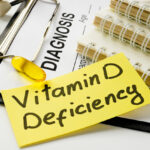Current vitamin D guidance inadequate for supporting heart health, researchers warn
 (NaturalHealth365) In the shadow of a growing health concern, researchers are issuing a resounding alarm regarding the pervasive deficiency in vitamin D. Reports shared at the American Heart Association’s Scientific Sessions 2023 bring to light the stark reality of inadequate guidance that leaves consumers navigating a foggy landscape when optimizing their vitamin D levels.
(NaturalHealth365) In the shadow of a growing health concern, researchers are issuing a resounding alarm regarding the pervasive deficiency in vitamin D. Reports shared at the American Heart Association’s Scientific Sessions 2023 bring to light the stark reality of inadequate guidance that leaves consumers navigating a foggy landscape when optimizing their vitamin D levels.
This deficiency is far from trivial, with potential ramifications extending to the heart’s well-being. As the evidence unfolds, the urgency to address and bridge the vitamin D gap intensifies, urging a closer look at the impact on heart health.
Vitamin D deficiency has the potential to become a public health crisis
For years, physicians have been cautioning patients about the dangers of insufficient vitamin D intake and the outdated guidelines surrounding this crucial nutrient. Surprisingly, this message has been slow to resonate both among patients and in mainstream media.
The highlighted study sheds light on the prevailing inadequacies in vitamin D guidance and recommended dietary allowances, revealing a stark contrast to the widespread awareness of vitamin D deficiency risks. The sobering truth is that a deficiency in vitamin D could pose considerable risks and lead to various health complications.
As far as vitamin D’s impact on heart health, it’s crucial to acknowledge diverse medical perspectives. Some scientists argue that evidence is inconclusive on vitamin D supplementation preventing significant adverse heart events. While hypotheses about vitamin D’s role in cardiovascular health exist, the medical community is still exploring the intricate connections between vitamin D receptors and blood vessel inflammation, hinting at the potential risks for heart problems.
It’s time to rethink vitamin D guidelines for heart health
The crucial insight derived from this study indicates that the existing guidance on vitamin D intake may be inadequately calibrated for optimal health. Notably, physicians are particularly concerned with serum vitamin D levels among individuals with a family history of heart issues or existing cardiac conditions.
Discover a Simple and Effective Way to Remove Toxins: This is Jonathan's #1 choice for at-home detoxification. Special offer ends Feb. 16.
Presently, the recommended dietary allowance (RDA) stands at 600 IU (international units) per day, with a slight adjustment to 800 IU for individuals aged 70 and above. However, the prevailing recommended daily intake benchmarks could undergo revision in light of emerging findings, such as those underscored in the aforementioned study. And, just to be clear, most holistic healthcare providers are suggesting that 5,000 to 10,000 IU of vitamin D3, plus adequate amounts of K2/boron/magnesium, is necessary – especially for those individuals severely deficient.
Simple ways to optimize your vitamin D levels
While vitamin D supplements play a crucial role, it’s essential to diversify your sources for this vital nutrient. Embrace the great outdoors and bask in natural sunlight, as exposure to sunlight remains a potent way to enhance your vitamin D levels. So, roll up your sleeves, don some shorts, and let your skin soak in the sunshine.
Additionally, consider making subtle adjustments to your diet to fortify your vitamin D intake. Incorporate foods rich in this essential nutrient, such as:
Seafood: Indulge in fatty wild-caught fish like salmon, and mackerel to savor a delicious meal and elevate your vitamin D levels.
Mushrooms: When exposed to sunlight during growth, certain varieties of mushrooms become a natural source of vitamin D. Including them in your meals adds a nutrient boost.
Egg yolks: Don’t discard the yolks! Cage-free, organic eggs are a versatile and nutritious option, providing a natural dose of vitamin D.
Important reminder: To know if you’re deficient or not in vitamin D, ‘test, don’t guess.’ A simple vitamin D blood test will reveal the truth. Most holistic healthcare providers will tell you that an optimal test result of 25-hydroxy vitamin D is between 50 and 80 ng/mL. For those people dealing with a cancer diagnosis, your range may need to be a bit higher. In reality, most people have test results much lower than 30 – 40 ng/mL. The bottom line, if you’re deficient, supplementation will be necessary to make corrections.
Diversifying your vitamin D intake through sunlight exposure, supplementation (if needed) and a well-rounded organic diet to ensure a holistic approach to maintaining optimal levels of this essential nutrient. Your future health will thank you for the efforts you make today.
Sources for this article include:



